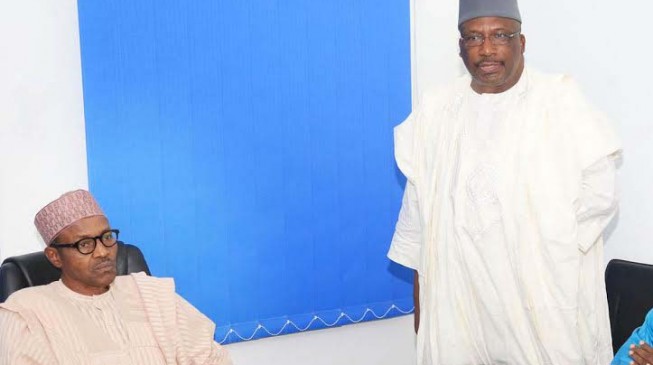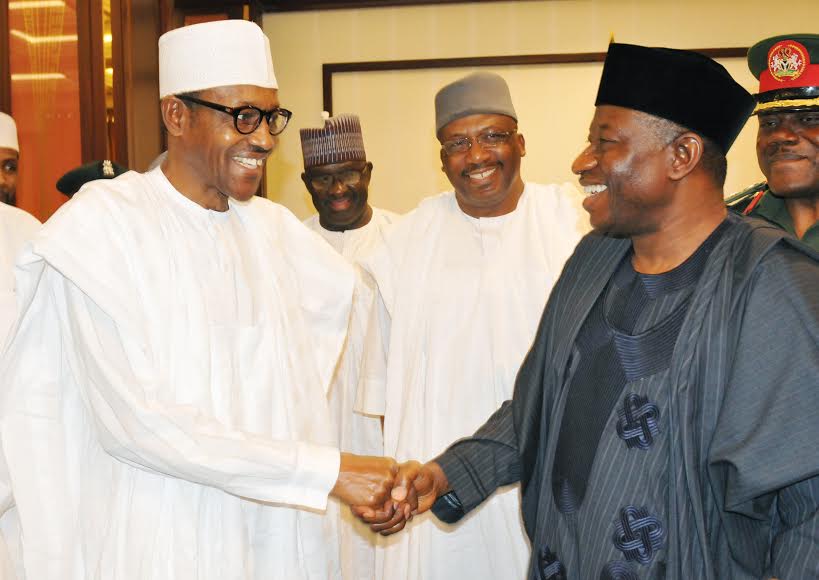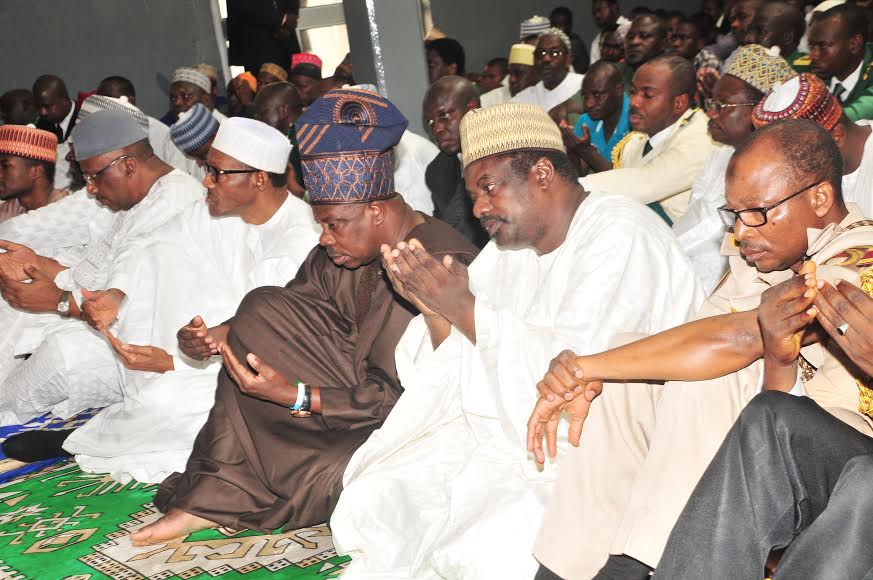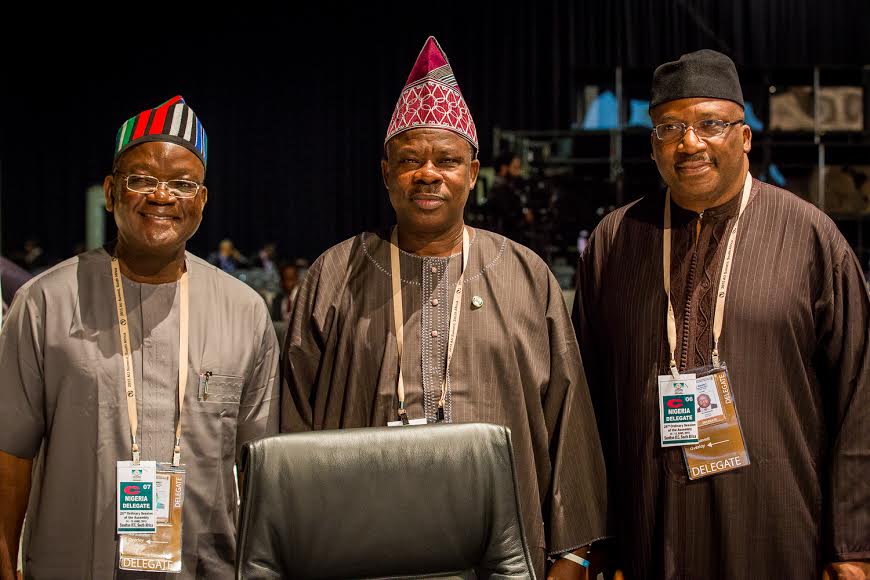•Senate will perform its functions –Saraki •Genesis of the crisis •Why Buhari sacked service chiefs
Written by:
Taiwo Adisa
A
tweet from the Twitter handle of the Senate president, Dr Bukola
Saraki, on Tuesday, stirred up controversy over whether or not the
Senate needs to confirm the newly appointed service chiefs appointed by
President Muhammadu Buhari on Monday
The Senate president had, early on Tuesday, tweeted that Buhari did not need to send the list of service chiefs to the Senate for confirmation, adding that only the ministers would be confirmed by the Senate.
But a barrage of issues were raised on Twitter against the Senate President following that tweet, a situation that led him to an amendment of the earlier position.
The office of the Senate President, in a statement later in Tuesday, said the Senate would be ready to screen the service chiefs anytime they were presented to the Senate.
Why Buhari sacked service chiefs
INDICATIONS emerged in Abuja, on Tuesday, that President Muhammadu Buhari’s forthcoming trip to the United States (US) for extensive bilateral, security, economic and financial discussions with President Barrack Obama and the need to answer certain questions about the terrorism challenges, as well as Nigeria’s military capability to tackle the menace conclusively necessitated the sack of the service chiefs.
Informed security sources disclosed to the Nigerian Tribune that the Buhari-led administration got wind of the fact that the Obama-led administration would want to know why, after so much money was devoted to the war on insurgency, including foreign contributions, the Boko Haram terrorists were still holding sway.
The source said definitely, the US would ask President Buhari why the military commanders (sacked service chiefs) were still in place, since after several months of being in control and getting huge financial support from the Jonathan-led administration, Boko Haram is still biting hard.
“They will present Buhari with the figures and ask how this huge amount of money was spent, and for what purposes? This is because America will tell President Buhari pointblank that we have a package to assist you to conquer this menace but it will be on the grounds that you have a new team with thinking faculty, a team that is tested and will spare no effort in ending the Boko Haram mayhem,” the source stated.
It further disclosed that President Buhari would now be able to tell Obama that “I have a new team in place. The team is trusted, with integrity, and primed to actualise my mission of ending Boko Haram insurgency.”
According to, the source, “Buhari will be in a better position to tell the US that he has set machinery in motion to investigate how the huge amount of money so far released to fight insurgency was spent and why, after such releases to the security agencies, many of the equipment promised to deal with Boko Haram are nowhere to be seen.”
“The attention of the Media Office of the Senate President has been drawn to a story making the rounds to the effect that the Senate does not need to screen or confirm the new service chiefs appointed by President Muhammadu Buhari.
“However, we want to make it abundantly clear that based on inquiries made to the Senate President, Dr Abubakar Bukola Saraki, on whether or not the Senate was consulted before the appointment of new service chiefs was announced, he had, in response, tweeted that the appointment of service chiefs is the exclusive function of the president as stipulated by the constitution.
“Let it be known that his comment is now being misinterpreted to say the Senate will neither screen nor confirm the new service chiefs. This is far from the truth.
“For the avoidance of doubt, Saraki has said his comment is without prejudice to extant laws and court pronouncements on the issue and, therefore, that the Senate will do the needful when the list of the new service chiefs is sent to it by Mr President,” the statement read.
Saraki, in a new tweet on Tuesday, said: “This is to clarify the earlier position which was not up to date and does not represent the position of the Senate President on the issue of screening of the newly appointed service chiefs. The Senate will perform its constitutional duty when it receives communication from the President on the appointments.”
Genesis of the crisis
Lagos lawyer, Festus Keyamo, had ignited the fire when he instituted a suit against the appointment of service chiefs by the immediate past president, Goodluck Jonathan.
The lawyer had said that his suit was to stop the Federal Government from continuing the practice where service chiefs were appointed without Senate confirmation under President Olusegun Obasanjo.
Keyamo secured a ruling in 2013, forcing the government in 2013 to send the list of service chiefs to the Senate. For the first time in the history of the nation’s democracy, service chiefs were confirmed by the Senate under the Jonathan-led administration.
Though Keyamo had relied on Section 218 of the 1999 Constitution and Armed Forces Act to back his claims before the Federal High Court, the constitution did not expressly require the president to send the list of service chiefs to the Senate for confirmation.
It was gathered that though former President Jonathan had announced while making the appointment of the last set of service chiefs that he would send the list for confirmation by the Senate, the government ran into trouble when it was to write the letter to seek the confirmation, as there was no clear section of the constitution to back up the action.
The government, thereafter, jettisoned the idea and asked the service chiefs to continue their work, but the ruling in favour of Keyamo’s suit at the Federal High Court changed the procedure, thus forcing the government to send the list of service chiefs to the Senate for the first time.
How the Senate will screen the service chiefs
Party ranking senator told the Nigerian Tribune that the Senate, during the last exercise, sent the service chiefs to its Committee on Defence for screening at a closed session, while the report would be made available to the Senate in plenary.
He stated that in view of the current scenario where committees were not yet formed, the Senate would adopt one of the two options, either to constitute themselves into a committee of the whole and screen them in closed session or appoint an ad hoc committee, which would then report to the Senate in plenary.
The Senate president had, early on Tuesday, tweeted that Buhari did not need to send the list of service chiefs to the Senate for confirmation, adding that only the ministers would be confirmed by the Senate.
But a barrage of issues were raised on Twitter against the Senate President following that tweet, a situation that led him to an amendment of the earlier position.
The office of the Senate President, in a statement later in Tuesday, said the Senate would be ready to screen the service chiefs anytime they were presented to the Senate.
Why Buhari sacked service chiefs
INDICATIONS emerged in Abuja, on Tuesday, that President Muhammadu Buhari’s forthcoming trip to the United States (US) for extensive bilateral, security, economic and financial discussions with President Barrack Obama and the need to answer certain questions about the terrorism challenges, as well as Nigeria’s military capability to tackle the menace conclusively necessitated the sack of the service chiefs.
Informed security sources disclosed to the Nigerian Tribune that the Buhari-led administration got wind of the fact that the Obama-led administration would want to know why, after so much money was devoted to the war on insurgency, including foreign contributions, the Boko Haram terrorists were still holding sway.
The source said definitely, the US would ask President Buhari why the military commanders (sacked service chiefs) were still in place, since after several months of being in control and getting huge financial support from the Jonathan-led administration, Boko Haram is still biting hard.
“They will present Buhari with the figures and ask how this huge amount of money was spent, and for what purposes? This is because America will tell President Buhari pointblank that we have a package to assist you to conquer this menace but it will be on the grounds that you have a new team with thinking faculty, a team that is tested and will spare no effort in ending the Boko Haram mayhem,” the source stated.
It further disclosed that President Buhari would now be able to tell Obama that “I have a new team in place. The team is trusted, with integrity, and primed to actualise my mission of ending Boko Haram insurgency.”
According to, the source, “Buhari will be in a better position to tell the US that he has set machinery in motion to investigate how the huge amount of money so far released to fight insurgency was spent and why, after such releases to the security agencies, many of the equipment promised to deal with Boko Haram are nowhere to be seen.”
“The attention of the Media Office of the Senate President has been drawn to a story making the rounds to the effect that the Senate does not need to screen or confirm the new service chiefs appointed by President Muhammadu Buhari.
“However, we want to make it abundantly clear that based on inquiries made to the Senate President, Dr Abubakar Bukola Saraki, on whether or not the Senate was consulted before the appointment of new service chiefs was announced, he had, in response, tweeted that the appointment of service chiefs is the exclusive function of the president as stipulated by the constitution.
“Let it be known that his comment is now being misinterpreted to say the Senate will neither screen nor confirm the new service chiefs. This is far from the truth.
“For the avoidance of doubt, Saraki has said his comment is without prejudice to extant laws and court pronouncements on the issue and, therefore, that the Senate will do the needful when the list of the new service chiefs is sent to it by Mr President,” the statement read.
Saraki, in a new tweet on Tuesday, said: “This is to clarify the earlier position which was not up to date and does not represent the position of the Senate President on the issue of screening of the newly appointed service chiefs. The Senate will perform its constitutional duty when it receives communication from the President on the appointments.”
Genesis of the crisis
Lagos lawyer, Festus Keyamo, had ignited the fire when he instituted a suit against the appointment of service chiefs by the immediate past president, Goodluck Jonathan.
The lawyer had said that his suit was to stop the Federal Government from continuing the practice where service chiefs were appointed without Senate confirmation under President Olusegun Obasanjo.
Keyamo secured a ruling in 2013, forcing the government in 2013 to send the list of service chiefs to the Senate. For the first time in the history of the nation’s democracy, service chiefs were confirmed by the Senate under the Jonathan-led administration.
Though Keyamo had relied on Section 218 of the 1999 Constitution and Armed Forces Act to back his claims before the Federal High Court, the constitution did not expressly require the president to send the list of service chiefs to the Senate for confirmation.
It was gathered that though former President Jonathan had announced while making the appointment of the last set of service chiefs that he would send the list for confirmation by the Senate, the government ran into trouble when it was to write the letter to seek the confirmation, as there was no clear section of the constitution to back up the action.
The government, thereafter, jettisoned the idea and asked the service chiefs to continue their work, but the ruling in favour of Keyamo’s suit at the Federal High Court changed the procedure, thus forcing the government to send the list of service chiefs to the Senate for the first time.
How the Senate will screen the service chiefs
Party ranking senator told the Nigerian Tribune that the Senate, during the last exercise, sent the service chiefs to its Committee on Defence for screening at a closed session, while the report would be made available to the Senate in plenary.
He stated that in view of the current scenario where committees were not yet formed, the Senate would adopt one of the two options, either to constitute themselves into a committee of the whole and screen them in closed session or appoint an ad hoc committee, which would then report to the Senate in plenary.




